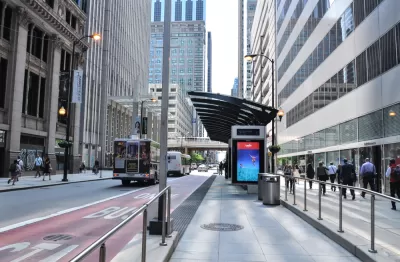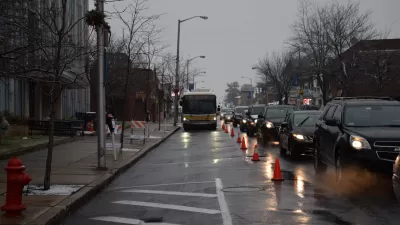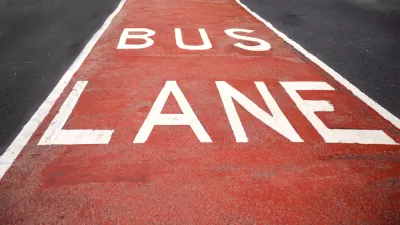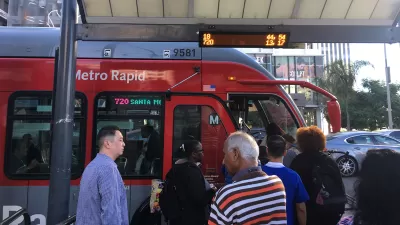A program championed by Chicago Mayor Lori Lightfoot to speed up bus service has new monentum from funding provided by Chicago's new fee on ride-hailing trips.

"In recent months the city has started to follow through on that promise with the CTA and the Chicago Department of Transportation’s $20 million Bus Priority Zones program, which seeks to eliminate bus “slow zones” caused by bottlenecks along the city’s busiest corridors," reports John Greenfield.
The program will eventually pull from a suite of options for improving bus priority on Chicago streets, like "red bus-only lanes, overhead signage, special signals at intersections that give buses a head start before private vehicles get a green light, and/or pedestrian improvements like sidewalk bump-outs."
One such street design feature is already in place on the downtown Loop Link corridor, but Greenfield says modest speed improvements are the fault of lax enforcement. "[Mayor Lori] Lightfoot hopes to help pass state legislation to legalize camera enforcement of bus lanes, which already exists in New York City.
The program is funded with a portion of the revenue generated by Chicago's new ride-hailing fee, approved by the City Council last week.
FULL STORY: Chicago’s Bus Priority Zone program shifts into high gear

Planetizen Federal Action Tracker
A weekly monitor of how Trump’s orders and actions are impacting planners and planning in America.

Maui's Vacation Rental Debate Turns Ugly
Verbal attacks, misinformation campaigns and fistfights plague a high-stakes debate to convert thousands of vacation rentals into long-term housing.

Restaurant Patios Were a Pandemic Win — Why Were They so Hard to Keep?
Social distancing requirements and changes in travel patterns prompted cities to pilot new uses for street and sidewalk space. Then it got complicated.

In California Battle of Housing vs. Environment, Housing Just Won
A new state law significantly limits the power of CEQA, an environmental review law that served as a powerful tool for blocking new development.

Boulder Eliminates Parking Minimums Citywide
Officials estimate the cost of building a single underground parking space at up to $100,000.

Orange County, Florida Adopts Largest US “Sprawl Repair” Code
The ‘Orange Code’ seeks to rectify decades of sprawl-inducing, car-oriented development.
Urban Design for Planners 1: Software Tools
This six-course series explores essential urban design concepts using open source software and equips planners with the tools they need to participate fully in the urban design process.
Planning for Universal Design
Learn the tools for implementing Universal Design in planning regulations.
Heyer Gruel & Associates PA
JM Goldson LLC
Custer County Colorado
City of Camden Redevelopment Agency
City of Astoria
Transportation Research & Education Center (TREC) at Portland State University
Jefferson Parish Government
Camden Redevelopment Agency
City of Claremont





























